From Classroom Research to Conference Presentation
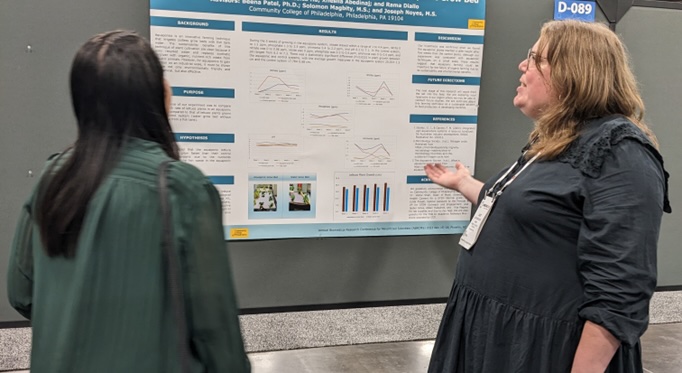
Judy Wentworth, who will start the Nursing program in 2024, shared her story about presenting her research at a high-profile academic conference. She reflects on how this experience has prepared her for her studies, and how faculty and staff helped her achieve this milestone.
In the fall 2022, I was honored to be one of five students who represented the College at the Annual Biomedical Research Conference for Minoritized Scientists (ABRCMS), one of the most prestigious STEM conferences for students and faculty in the country. It was an extraordinary opportunity made possible by one of CCP’s outstanding professor/mentors, Dr. Beena Patel, as well as the College’s dedicated team of administrators.
When I started my CCP journey in fall, I had not taken a science class in 15 years. It had also been two years since I had to stop working due to my disability. For those reasons, I was not sure if I would have the stamina to succeed in my first CCP course, BIOL 106: General Biology. Little did I know I was about to discover a passion and aptitude for science—specifically biology!—that I didn’t know I possessed, as well as a culture of academic rigor and support that I never expected to find at a community college. Certainly, I could not have dreamt how all of those wonderful surprises would lead to one of the biggest academic achievements of my life: presenting a scientific poster about aquaponics agriculture in Phoenix, Arizona, at a five-day conference attended by thousands of people.
The ABRCMS conference is a flagship program of the American Society for Microbiology and is designed to position students with marginalized identities for ambitious academic and professional careers in science. Each ABRCMS participant customizes their own conference program, attending whichever panel discussions, keynote addresses and student presentations sound most intriguing. The sessions I enjoyed most focused on issues of disability justice in research labs, as well as cutting-edge work to cultivate a more diverse, equitable and inclusive ecosystem throughout academia.
Every single facet of my ABRCMS experience pushed my confidence and goals irreversibly forward. Boarding the plane out of Philadelphia International Airport and seeing other ABRCMS-bound passengers—easily identifiable by their poster tubes and “Ask Me About My Research!” pins—signaled to my nervous system that my life trajectory was changing. At that moment, it dawned on me that I was joining a vast and diverse community of emerging scientists who had all been recognized and invested in by their own visionary professors and institutions—their own Dr. Patels and CCPs.
The pinnacle of my conference experience was presenting at one of the poster sessions alongside hundreds of other students, including many from the most illustrious universities in the country. I thought I would be nervous to field questions about my poster from passersby, but I became more and more comfortable with each conversation. I was also visited by a series of three conference judges who asked very thoughtful questions and congratulated Dr. Patel and myself.
The research that I had the opportunity to present at ABRCMS is from an experiment designed by Dr. Patel and meticulously carried out by the students from multiple sections, including mine, of her General Biology course. The experiment tested the efficacy of a form of plant cultivation called aquaponics. We had one grow bed connected to an active fish tank in a closed-loop aquaponic system, and another simple water grow bed, irrigated with tap water, that we used as our experimental control.
Over the course of the five-week experiment, we measured the nitrate, nitrite, phosphate, ammonia and pH levels in the two different grow beds, as well as the size of the plants in both beds. Our findings are reflected in the title of my conference abstract: “Nutrients from Fish Waste Enhance Plant Growth in Aquaponic Grow Bed.” What this relatively simple experiment demonstrates is that this sustainable, resource-efficient farming technique can yield robust crop outputs, at least on a small scale. The next phase of this research, which Dr. Patel and Prof. Magbity will be carrying out this year in their classes, will explore the viability of aquaponic agriculture on a larger scale and in a natural environment. Aquaponic farming at an industrial scale has the potential to help combat climate change.
When Dr. Patel encouraged me to apply to the ABRCMS conference, she coached me on compiling and analyzing all the data that our classes had collected. She then mentored me through the process of writing a compelling abstract and application to submit to the ABRCMS admissions team. One of my favorite CCP classroom memories will always be the last lab session of Dr. Patel’s BIOL 241: Principles of Microbiology class. The gel electrophoresis lab was extremely cool in and of itself. Additionally, whenever there were a few minutes of downtime, Dr. Patel would say, “Judy, come with me,” and we would return to our ABRCMS submission process on the computer in the adjoining room.
Once we received the invitation to the conference, Dr. Patel advised me on creating an effective research poster and preparing for my oral presentation. It is entirely thanks to Dr. Patel’s vision, her tireless dedication to student success and her decades of experience in biology research that I had this opportunity to represent our College on the national stage. With continued support from the CCP administration, I am confident that such incredible opportunities for students will become more plentiful.
Special thanks are due to: my fellow CCP students Jessica Ha, Xhesila Abedinaj, and Rama Diallo, for helping to prepare the research findings; Dr. Beena Patel, Prof. Solomon Magbity, M.S.; and Prof. Joseph Noyes, M.S., for serving as research advisors; Dr. Vishal Shah, Dean of Math, Science and Health Careers, for providing a STEM internal grant; Dr. Linda Powell, Special Assistant to the Vice President on STEM Outreach and Engagement; Isabel Gines, Abeer Hudaihed, and Rita Pagano for lab supply and day-to-day help; Dr. Woosly Calixte, Pathways Student Success Coordinator, Title III Grant Office; and the Full-Time Faculty Travel Grant provided by the College.
—Judy Wentworth
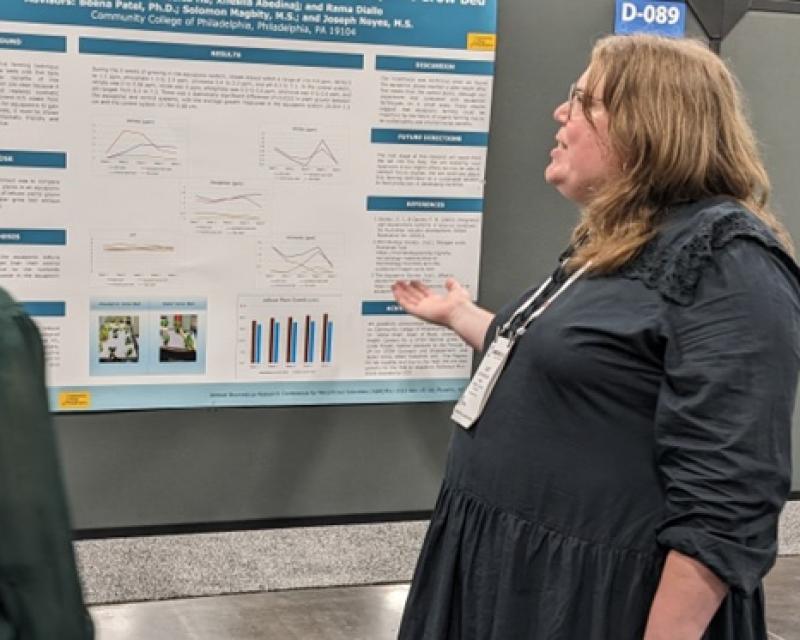
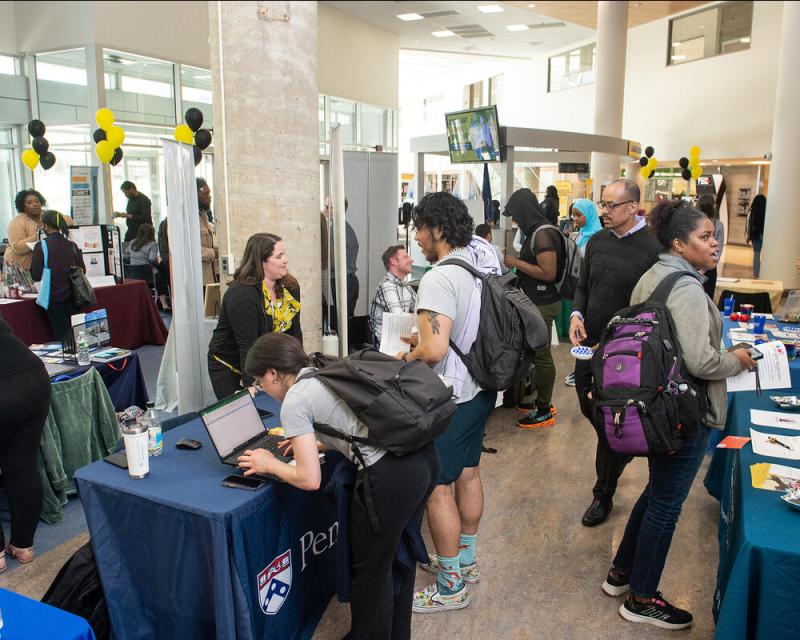
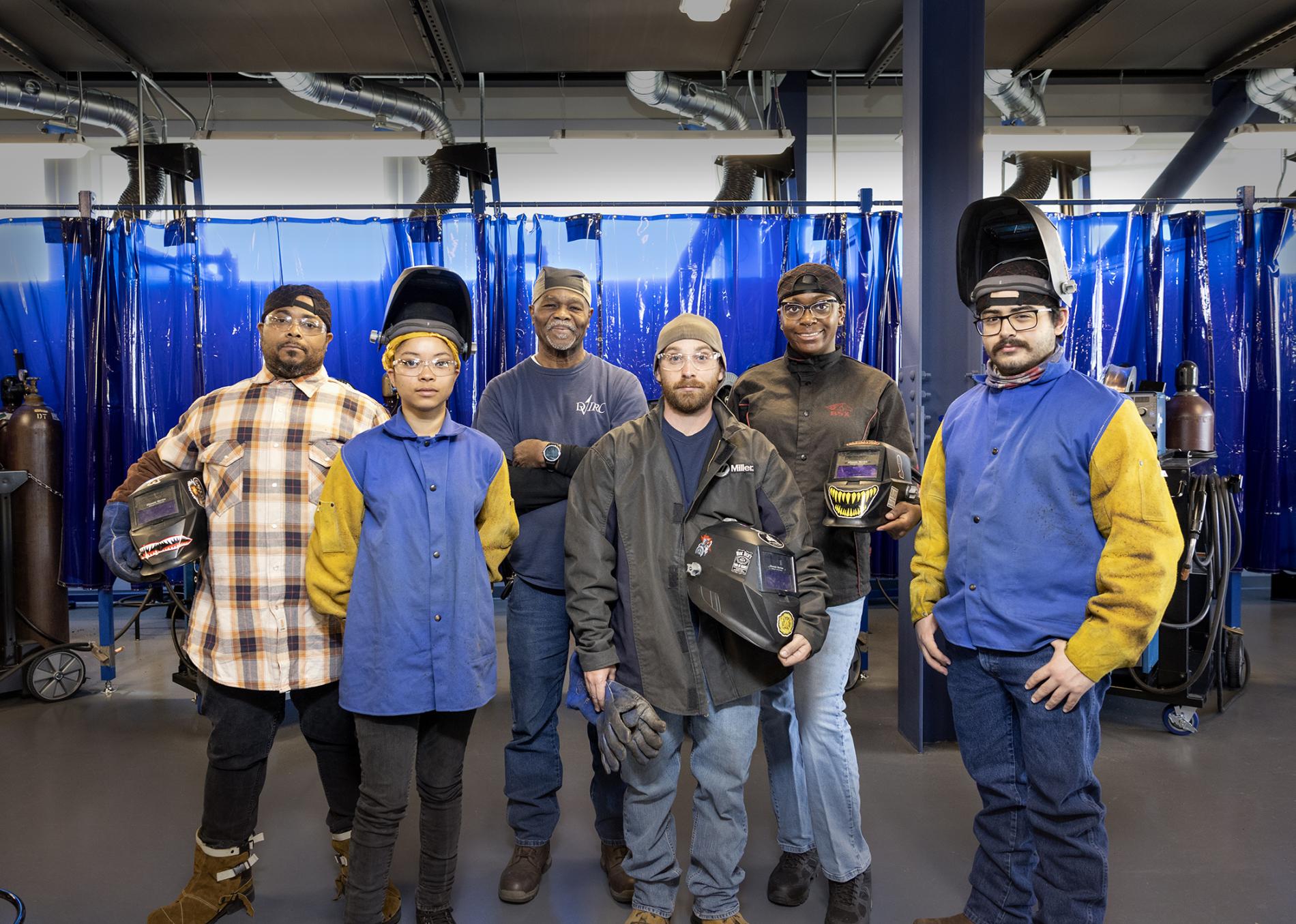 Twenty-one-year-old Camyra Sawyer was the first woman to complete the
Twenty-one-year-old Camyra Sawyer was the first woman to complete the 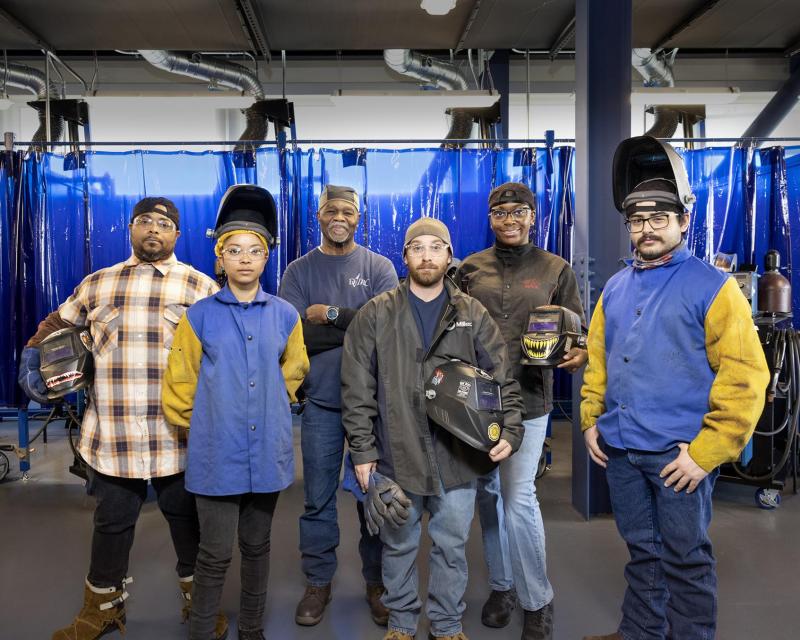
 If you want to learn from the best, your instructor has to love what they do. When it comes to automotives, the best instructors love cars. And trucks. And motorcycles. And anything with an engine and wheels.
If you want to learn from the best, your instructor has to love what they do. When it comes to automotives, the best instructors love cars. And trucks. And motorcycles. And anything with an engine and wheels.

 Meet Dr. Vance Gray, the College’s associate provost of Academic Affairs and Workforce Development. Dr. Gray comes to the College from Olive-Harvey College, City Colleges of Chicago in Illinois as dean of Instruction and Academic Affairs. He started at the College in January 2023 as the associate vice president for Academic and Student Success before assuming his current role. Here, he discusses his experiences thus far and his hopes for students.
Meet Dr. Vance Gray, the College’s associate provost of Academic Affairs and Workforce Development. Dr. Gray comes to the College from Olive-Harvey College, City Colleges of Chicago in Illinois as dean of Instruction and Academic Affairs. He started at the College in January 2023 as the associate vice president for Academic and Student Success before assuming his current role. Here, he discusses his experiences thus far and his hopes for students. In January 2023, the College welcomed Dr. Brad Kovaleski as the new dean of students.
In January 2023, the College welcomed Dr. Brad Kovaleski as the new dean of students.